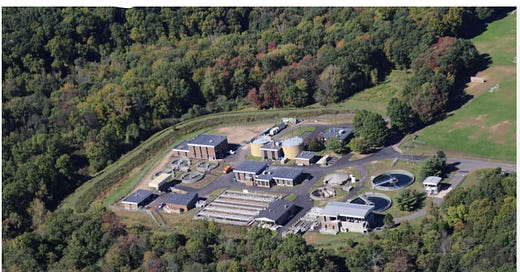Out of sight. Out of mind.
The critical town service few of us ever think about - wastewater treatment and pollution control.
by Deena Allard, Cheshire Town Councilor.
Do you care about the environment and want to prevent pollution? So do we!
Members from the town council including myself had the opportunity to tour Cheshire’s Wastewater Treatment Plant (WWTP), tucked in the back of Quinnipiac Park, and which operates 24/7 to protect us and our waterways from harmful pollutants. While there were definitely parts of the tour that were a bit well, stinky and made us want to block our noses, the experience overall was very eye opening and educational.
Federal and CT State regulations mandate that wastewater from all commercial, business, and residential toilets, sinks, washing machines, dishwashers, etc. must be purified before it can be returned to the environment.
The journey of our wastewater here in Cheshire begins with everything going down the drains and out the main sewer line of each building and ends at the Quinnipiac River. The wastewater, otherwise known as effluent, then travels mostly by gravity, with the assist of nine strategically placed pump stations, through an underground network of pipes that are approximately 120 miles long. When it arrives at the Wastewater Treatment Plant, it contains everything that has been washed down a drain or flushed down a toilet. And I do mean everything.
While items like toilet wipes and feminine hygiene products are labeled as “flushable”, that only means that they will go down the toilet. However, these products are not usually biodegradable and need to be screened out when they arrive at the plant. These items may be unlikely to clog your plumbing, but they sometimes clog the heavy machinery at the plant and can cause expensive repairs. The extracted biosolids from the initial screening process are compressed and hauled offsite for further processing and incineration.
When the preliminary screening is completed, the resulting liquid effluent contains harmful contaminants and is not suitable to be returned to our precious water ways. It is then sent through a series of settling tanks where smaller solids are removed and is further treated by both chemical and biological methods for purification. The water is then passed through UV lighting as a final means of disinfection before it is returned to the Quinnipiac River. It is tested throughout the process to ensure it meets or exceeds the Federal and CT State Clean Water requirements. According to David Milano, the WWTP superintendent, the water that the town of Cheshire puts into the Quinnipiac River is actually cleaner than the water that is currently in the river. Now, that’s something we can all be proud of.
Cheshire’s Wastewater Treatment Plant was built over 50 years ago and operates twenty-four hours a day, seven days a week. Maintaining this facility is critical to the health and safety of all. The FY2024-2025 Capital Budget, the Council passed in July, includes significant investments in WWTP repairs and upgrades to keep Cheshire ‘flowing’ in the right direction. Click (HERE) for more info on the Capital Budget. Your tax dollars working hard for you and paying for a critical service and infrastructure. Here are some simple ways you can help to keep the Wastewater Treatment Plant and our sewer system working effectively, reducing the need for frequent, costly repairs:
Avoid flushing products other than toilet paper. Flushable toilet wipes, baby wipes and feminine hygiene products can clog and break the screening machinery.
Never pour fats, oils, or grease down the drain. They accumulate on the inside walls of the pipes, occluding the flow and sometimes causing expensive blockages in the underground pipes. Fats, Oils and Grease should be cooled and solidified and simply thrown in the trash.
To assist with these efforts, the Ordinance Review Committee has recommended a new (FOG) Management Ordinance to ensure that food services establishments are meeting requirements. This will not only help prevent sanitary sewer overflows, but also seeks to protect and prevent taxpayers from being responsible for food service establishments that may be in violation of State requirements. The public hearing for the FOG ordinance will be held on Tuesday, September 10th at 7:00pm. Details regarding the FOG Management Ordinance can be found (HERE).




This is useful info and appreciated—it does speak to the fact that we are now living in a news desert 💔 Missing independent small town newspapers.
Thank you Madam Councilor for the notice of this important public hearing. I might have missed it otherwise. I may have to duck out to catch the equally important Presidential debate.